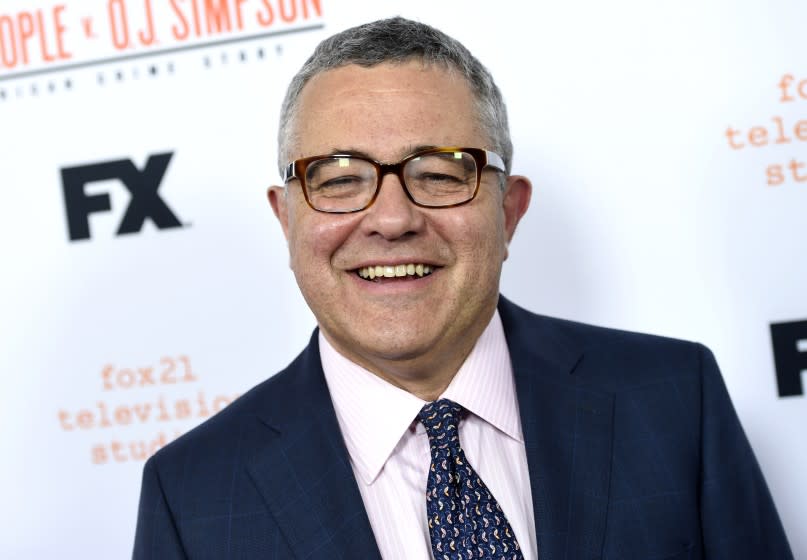Column: Jeffrey Toobin apologized after his sex scandal; Tavis Smiley did not. Does either belong on air?

CNN anchor Alisyn Camerota wasted no time putting her guest on the spot.
“I feel like we should address what’s happened in the months since we’ve seen you,” she told the legal analyst and writer Jeffrey Toobin, whose online misbehavior last year gave rise to the hashtag #MeToobin.
“In October, you were on a Zoom call with your colleagues from the New Yorker magazine,” Camerota began. “Everyone took a break for several minutes during which time you were caught masturbating on camera. You were subsequently fired from that job after 27 years of working there. And you have since then been on leave from CNN. Do I have it all right?”
“You’ve got it all right,” replied Toobin. “Sad to say.”
They spent the next eight cringe-inducing minutes discussing Toobin’s transgression.
Toobin could not explain his “deeply moronic and indefensible” act, other than to say he didn’t realize the camera was still on and that he is a “flawed human being.”
“It was wrong, it was stupid and I am trying to be a better person,” he said.
Did the world need to witness this act of self-flagellation?
Yes, indeed, because if you are a public figure trying to come back from a sex scandal, we need proof that you understand what you did, why it was wrong and how it affected others.
You are going to have to grovel.
And even then, after taking responsibility and making amends, it’s not a given that the world will benefit from or welcome your reentry, or that your victims will not be retraumatized.
Which is why the return of former PBS star Tavis Smiley is so problematic.
Last week, he launched a new Los Angeles radio station, KBLA, which, according to the Associated Press, “will offer a Black and progressive perspective on the city and nation.” He plans to spend three hours a day on air, weekdays from 9 a.m. to noon.
The move comes nearly four years after PBS ended its long-standing relationship with Smiley after determining he had engaged in multiple sexual relationships with subordinates and was also credibly accused of sexual harassment. (Variety reported that one of his female employees settled her sexual harassment complaint for $325,000.)
Smiley has never apologized, nor even accepted blame for his behavior.
“I have never harassed anyone,” Smiley told the AP. “I have no idea why what happened to me happened. This MeToo moment happened at a time and in a way where it was very difficult, almost impossible, to put forth any other narrative, no matter how truthful that narrative was.”
If you are tempted to believe him, just be aware that Smiley sued PBS for wrongful termination and lost.
After hearing testimony from six women, a jury found that Smiley was in breach of the network’s morals clause. A judge then ruled he owed PBS nearly $2.6 million.
Smiley, reported the AP, has appealed.
::
The road to redemption from MeToo scandals is littered with the carcasses of men who tried and failed.
They tried to come back too soon, they didn’t accept responsibility for what they had done, they positioned themselves as victims.
The poster child for this cohort is Jian Ghomeshi, the Canadian talk show host who was acquitted in 2016 of criminal charges that he brutally assaulted six women during sex. At least 20 women had accused him of sexual abuse or harassment.
And then, in 2018, he wrote an essay for the New York Review of Books that so blatantly minimized his behavior — he said he was “emotionally thoughtless”— that the editor of the publication, Ian Buruma, stepped down amid a firestorm of criticism.
And then there was radio host John Hockenberry, who took early retirement from WNYC in 2017 after numerous accusations of workplace sexual harassment. In late 2018, he penned a self-pitying essay for Harper’s magazine titled "Exile," in which he bemoaned “my misfortunes” and “open season on me.”
Ghomeshi has gone on to host a podcast aimed at Iranian Canadians, a far cry from his influential days as host of the syndicated CBC arts and culture show “Q.”
Hockenberry seems to have slipped below the public radar. He has not tweeted since September 2018.
In 2019, two years after the MeToo movement pulled back the scrim on so much appalling male workplace behavior, NPR broadcast a story about what redemption might look like for some.
"It's going to be subjective," said attorney Ari Wilkenfeld, who represented one of Matt Lauer's accusers, "but I really do feel we're going to know it when we see it."
Toobin and Smiley make for excellent case studies.
In Toobin’s case, what we saw on television on June 10 certainly amounted to a sincere apology and acknowledgment of the damage done to his colleagues and family. (Even though he managed to sneak in a self-serving plug for his next book.)
Smiley's recalcitrance is unforgivable.
@AbcarianLAT
This story originally appeared in Los Angeles Times.

